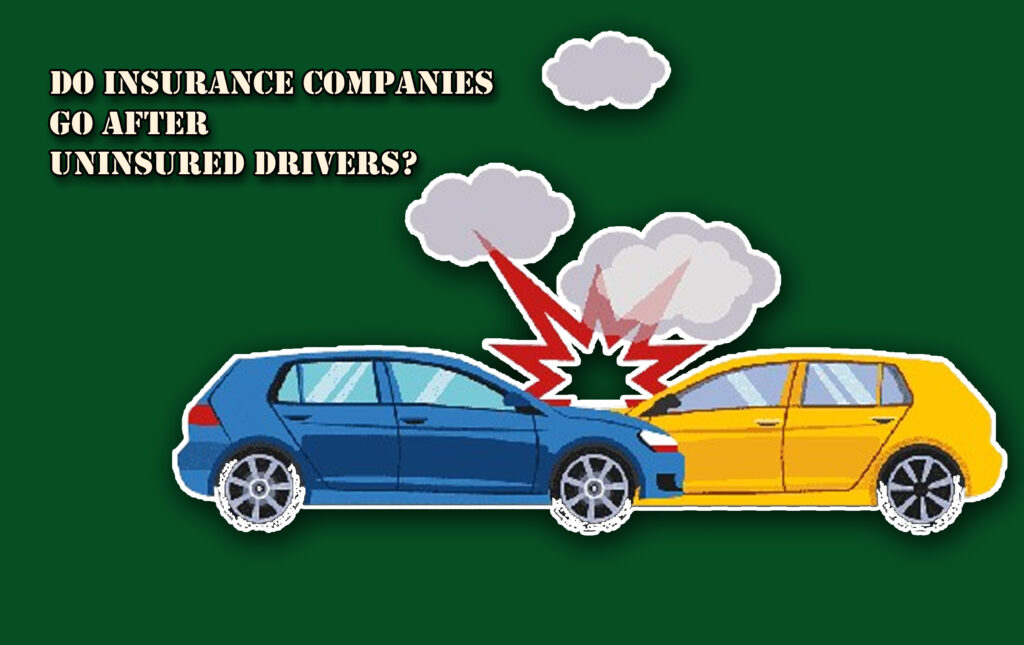What happens when an uninsured driver causes an accident? Do insurance companies go after uninsured drivers to recover damages?

When an accident involves an uninsured driver, insurance companies often face the challenge of recovering the costs associated with the damages.
Depending on the circumstances, they may take legal action to seek reimbursement from the at-fault uninsured driver.
This process, known as subrogation, allows insurance providers to recover the money paid out to their policyholders.
However, the decision to go after an uninsured driver depends on several factors, such as the driver’s financial situation, the extent of the damages, and the likelihood of successful recovery.
If the driver lacks sufficient assets or income, pursuing them might not be worth the effort for the insurance company.
This article will explore how insurance companies handle cases involving uninsured drivers and when they might go after uninsured drivers.
When Might Insurance Companies Go After Uninsured Drivers?
Insurance companies have the legal right to recover damages from uninsured drivers through a process called subrogation. However, pursuing an uninsured driver isn’t always straightforward.
Insurance providers will weigh the costs and benefits of legal action before deciding to proceed. For instance, if the uninsured driver lacks financial resources, the effort to recover damages might not be worth the time and money involved.
In cases where an insured driver is involved in an accident caused by an uninsured motorist, insurance companies often step in to compensate their policyholders. Afterward, they may attempt to recover the costs from the at-fault uninsured driver.
Do You Need Uninsured Driver Coverage?
Absolutely. Uninsured driver coverage provides vital protection in situations where the at-fault driver lacks insurance.
With uninsured motorist (UM) or underinsured motorist (UIM) coverage, your expenses; including medical bills and property damage; are covered if an uninsured or underinsured driver causes an accident.
In some states, carrying UM or UIM coverage is mandatory. Even in states where it’s optional, having this coverage ensures you aren’t left to shoulder the financial burden when another driver’s insurance falls short.
However, it’s important to review your policy carefully, as UM and UIM claims often have coverage limits specified in the fine print.
Additionally, many insurance companies require you to file a UM or UIM claim within a specific timeframe, which can be as short as 30 days. Failing to file within this window may result in a denial of your claim, leaving you without reimbursement.
Car Insurance vs. Collision Coverage
While uninsured motorist coverage offers protection for both property damage and medical expenses, collision coverage focuses solely on repairing or replacing your vehicle.
If you’re hit by an at-fault uninsured driver or involved in a hit-and-run, collision coverage takes care of your car repairs. However, it does not cover medical costs or bodily injuries. For comprehensive protection, you may need a combination of coverages.
What Should You Do If Your UM Or UIM Claim Is Denied?
It’s not uncommon for insurance companies to deny claims, even for UM or UIM coverage. If your claim is denied, it’s essential to understand why.
Insurers may cite specific clauses in your policy or other technicalities to justify their decision. When this happens, reaching out to an experienced accident lawyer can make a significant difference.
An attorney can help you navigate the claims process and advocate for your right to compensation.
What If An Uninsured Driver Hits You?
If you’re involved in an accident caused by an uninsured driver, your first priority should be ensuring your safety and reporting the accident to the authorities.
Afterward, it’s wise to consult with a knowledgeable attorney. While your insurer may help cover damages through UM or UIM coverage, legal representation can be invaluable for more complex claims or disputes.
Can You File A Lawsuit Against An Uninsured Driver?
Filing a lawsuit against an uninsured driver is an option, but it comes with challenges. Winning the case and obtaining a favorable judgment doesn’t guarantee that the driver will have the means to pay.
Many uninsured drivers lack the financial resources to satisfy a judgment, making recovery difficult even after a legal victory.
What Happens If The Uninsured Driver Is Using An Insured Vehicle?
If the uninsured driver was operating a vehicle covered by insurance, the vehicle owner’s policy may cover the damages.
However, complications can arise if the driver wasn’t authorized to use the vehicle or if they were excluded from the policy. In such cases, the details in the policy’s fine print will determine the outcome.
Understanding your coverage and taking proactive steps after an accident can save you from financial strain. Whether it’s reviewing your policy or consulting with legal professionals, preparation is key when dealing with uninsured drivers.



